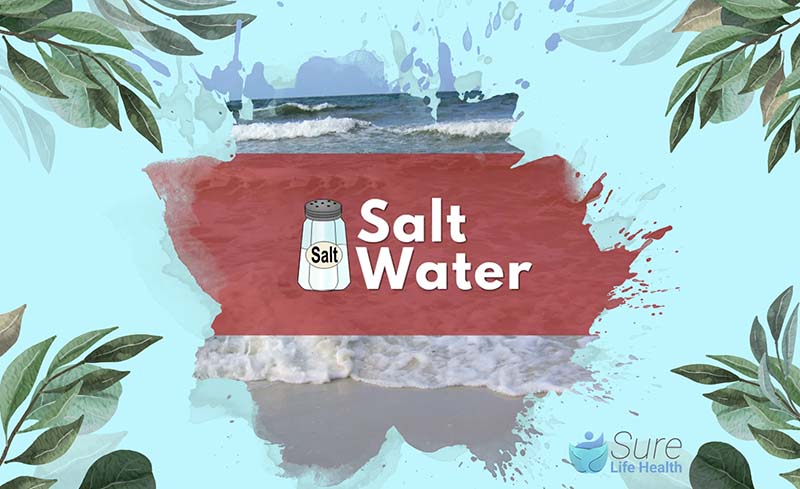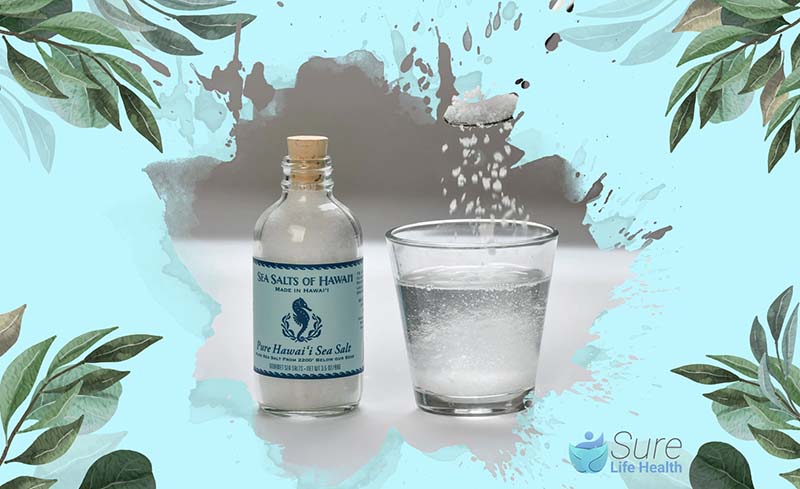You might have seen those dramatic images of people coming out of the Dead Sea, their hair transformed into a brittle, dry mess – an intriguing sight indeed. With summer inviting us with the promise of perfect beachy waves, it’s easy to overlook how it can also quietly damage our tresses. Interestingly, it’s not the sand or the act of swimming that’s harmful – it’s the salt in the seawater.
In this article, we examine the effects of saltwater on hair, asking the question: Is Salt Water Good for Hair ? Let’s explore the science behind how saltwater interacts with your locks and determine whether it is beneficial or detrimental to the health of your hair. Join us as we navigate through these salty waters and make this summer both enjoyable and kind to your hair.
Is Salt Water Good for Hair
Salt water is often praised for its mineral content, including magnesium and sodium, which can hydrate hair shafts. When your hair comes into contact with salt water, these minerals settle on the hair cuticle, refreshing and rehydrating dried-out strands. Initially, this can make your hair feel more textured and voluminous.
However, there’s a downside: frequent exposure to salt water can eventually dry out your hair. This occurs because salt can draw moisture from the hair into the environment, leaving your strands dehydrated. Therefore, while occasional dips in the ocean can be beneficial, it’s important to enjoy them in moderation to keep your hair healthy.

Advantages of Salt Water for Your Hair
Salt water offers several benefits for your hair that are worth exploring:
Scalp Health: Salt water acts as a natural exfoliant for the scalp, removing dead skin cells and improving blood circulation. Enhanced blood flow means more nutrients reach the hair follicles, potentially boosting hair growth. Combining this with a good scalp massage or a natural hair serum can further enhance these effects.
Anti-fungal Properties: Salt water has natural anti-fungal capabilities, providing relief for itchy, flaky scalps and helping to control dandruff. However, it’s important to balance its use, as excessive exposure to salt water can dry out the scalp.
Natural Cleanser: Acting like a natural shampoo, salt water can cut through excess sebum and oils on the scalp, leaving your hair feeling cleaner and less greasy. This is particularly beneficial for those with oily hair types.
Volumizing Effects: The crystals in salt water can lift the hair cuticle, adding volume and body. This lifting effect helps to volumize the roots and create the popular beachy waves look. Salt helps to form additional crosslinks within the hair’s structure, enhancing natural waves and curls thanks to the interaction of sodium chloride and magnesium sulfate with the hair’s keratin proteins and amino acids.
Overall, while salt water can be beneficial, it’s crucial to use it wisely to avoid drying out your hair and scalp.

Negative Effects of Salt Water on Your Hair
While salt water can have some beneficial effects on hair, it also carries potential downsides that are worth considering:
Dehydration: Salt water is notorious for its ability to dehydrate both your hair and scalp. This results in hair that feels dry, brittle, and frizzy because the salt draws moisture away, leaving your strands parched.
Weakening: Frequent exposure to salt water can weaken the hair cuticle—the protective outer layer of your hair. Damage to the cuticle often manifests as split ends, increased breakage, and a frizzy appearance, making your hair more vulnerable to further damage.
Color Fading: For those with dyed or highlighted hair, salt water can accelerate color fading. The salt in the water strips away hair color, leading to a dulled appearance and the need for more frequent touch-ups.
Scalp Irritation: Salt water can also irritate the scalp, particularly if you have sensitive skin. This irritation can cause discomfort in the form of itching, redness, and flaking, compounding any pre-existing scalp issues.
Understanding these negative effects can help you balance the pros and cons of salt water exposure, ensuring you take the right precautions to protect your hair and scalp health.
How to Use Salt Water on Hair in Two Scenarios
Salt Hair Spray Application
Salt hair sprays are a convenient and controlled way to apply salt water to your hair. To use, simply spritz the spray throughout your hair, paying special attention to the roots if you desire added volume.
These sprays are readily available in stores and often include additional ingredients to protect your hair. Alternatively, you can create your own salt hair spray at home by mixing water and salt in a spray bottle. This method lets you adjust the salt concentration based on your personal preference and hair type.

Swimming in the Sea
For those fortunate enough to live near the ocean, swimming in the sea offers a natural way to achieve textured, voluminous hair. After a swim, as your hair dries, you may notice enhanced body and the quintessential “beach waves” that many aim to replicate with products.
This method provides a full, natural application of salt water, but it’s important to consider the potential drying effects and rinse your hair with fresh water afterwards to mitigate damage.

Tips for Safeguarding Your Hair from Salt Water Exposure
Choose a Protective Hairstyle: Before hitting the beach, style your hair in braids or a bun. These protective hairstyles help minimize the amount of salt water your hair absorbs, though they won’t completely prevent damage.
Rinse Hair Thoroughly with Clean Water: It’s important to wash your hair with fresh, clean water immediately after swimming. This helps remove salt, preventing it from crystallizing on your hair shaft and leading to breakage. Always bring an extra bottle of water to the beach for this purpose.

Wear a Swim Cap: For optimal protection, wear a swim cap while swimming. This keeps your hair dry and shields it from salt water. For an added benefit, apply a moisturizing product under the cap to nourish your hair while you swim.
Use Nourishing Hair Care Products: Adjust your hair care routine to include hydrating products that counteract the drying effects of salt water. High-quality hair masks or seed oils, rich in ingredients like olive oil, argan oil, and coconut oil, offer hydration and significant protection against the damaging effects of salt.
Apply a Barrier Product: Before diving into the sea, coat your hair with a barrier product such as a hair mask or oil. This layer helps lock in moisture and prevents the salt water from drying out your hair. If you don’t have a specific product available, a simple rinse with fresh water before swimming can also help protect your hair.
By implementing these tips, you can enjoy the beach while keeping your hair protected and nourished.
Can You Leave Salt Water In Your Hair Overnight?
It’s not recommended to leave salt water in your hair overnight. Salt water can be quite drying, leaving your hair parched and brittle if not rinsed out promptly.
Nadia Dean, a Senior Stylist at John Frieda salons, strongly advises rinsing your hair with fresh water as soon as possible after swimming. She suggests, “Even if it’s just with bottled water while still at the beach, make sure to rinse your hair soon after exposure to salt water.” This helps prevent the salt from causing further dryness, damage, and breakage.

Conclusion
The effects of salt water on skin and hair are indeed a blend of benefits and drawbacks. While salt water acts as a natural exfoliant for both skin and scalp, improving complexion and fostering a healthier environment for hair growth, it also comes with certain risks. The ocean can strip away product buildup, sweat, and dirt, enhancing hair volume and shine, and the vitamins and minerals in seawater nourish the hair, potentially improving its texture and appearance. Salt water may even aid in drying out acne.
However, it’s crucial to remember that these benefits can be accompanied by less desirable effects such as dryness, redness, and irritation, particularly with frequent exposure. So, is salt water good for hair? The answer lies in moderation. While salt water can be a natural and effective treatment for hair and skin, balancing its use and ensuring proper aftercare is essential to maintaining overall skin and hair health.
Be sure to explore more insightful blogs from Sure Life Health, where we continue to shed light on the latest trends and breakthroughs in health and wellness.
Professor Gaye Cunnane, PhD, MB, FRCPI
As the Director of Health and Wellbeing at RCPI, Professor Gaye Cunnane is at the helm of initiatives aimed at enhancing the health and well-being of RCPI Trainers and Trainees. Her role extends beyond administration; she is also a respected clinical professor of rheumatology and a consultant rheumatologist at Trinity College Dublin (TCD) and St James’s Hospital. Prof. Cunnane’s medical journey began at TCD, where she graduated from medical school, and her path has been marked by both clinical and academic excellence.
After completing her basic clinical training in medicine, she embarked on PhD studies at University College Dublin and St Vincent’s University Hospital. Her research during this period was focused on prognostic markers in early inflammatory arthritis, a project that saw her collaborating with esteemed universities across Europe, including in Switzerland, The Netherlands, the UK, and Sweden.
Prof. Cunnane’s career took her to the University of California, San Francisco, where she spent three years delving into research on new treatments for lupus. Her academic prowess led her to the University of Leeds in 2001 as a senior lecturer, before returning to Ireland in 2003 to assume her current roles. She has also served as the National Specialty Director for Rheumatology training in Ireland, Programme Director for Basic Specialist Training with RCPI, and as a past President of the Irish Society for Rheumatology.
PUBLISHED ARTICLES
“Rheumatic disease differentiation using immunoglobulin G sugar printing by high-density electrophoresis”: Published in The Journal of Rheumatology, this study reflects her in-depth investigation into rheumatic diseases.
“Benefits of exercise in patients with rheumatoid arthritis: a randomized controlled trial”: This research work, highlighting the positive impact of exercise on rheumatoid arthritis, underscores Prof. Cunnane’s dedication to practical, patient-centered research.
Additionally, Prof. Cunnane has made notable contributions to the Annals of the Rheumatic Diseases, discussing early referral, diagnosis, and treatment of rheumatoid arthritis. She has also been involved in a study on the NCBI platform investigating exercise benefits in rheumatoid arthritis patients.
Professor Gaye Cunnane’s career is a testament to her commitment to improving patient outcomes in rheumatology through rigorous research, clinical excellence, and dedicated teaching. Her work continues to influence the field of rheumatology, both in Ireland and internationally.

